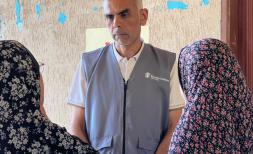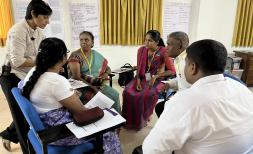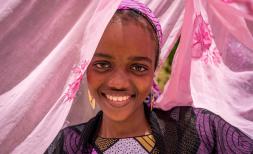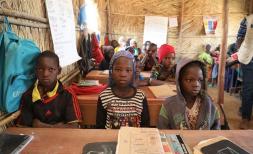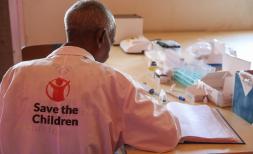The COVID-19 pandemic and my rights
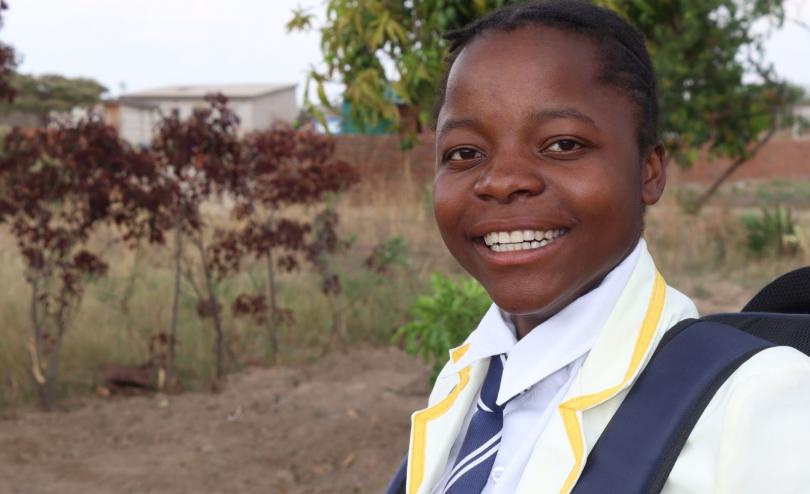
Cute, 16, Zimbabwe, speaks up for her rights
To mark World Children’s Day, the anniversary of the UN Convention on the Rights of the Child*, we hear from a girl in Zimbabwe. She knows her rights, she sees and lives the issues that children face and she is calling on governments to do more…
Hi World!
I’m Cute. I know what you are thinking but that is actually my name! I am a 16-year-old girl. I live in a small rural community in Zimbabwe. I live with my mom and my little sister.
My mom is not formally employed like a lot of people in my community. So, the COVID-19 lockdown meant our stall at the local market place was closed. That meant we had no more money coming in and could only afford two small meals per day.
Shortage of clean water is a huge problem in my community. Community wells have dried up and the few boreholes available are simply not enough. As a result, me and my peers wake up as early as 4am to join the long queues at the boreholes. Even then there is no guarantee that you get the water.
A lot of girls my age are abused by borehole queue marshals who ask for sexual favours in exchange for a place in front of the queue. Often, we have no choice but to take the little money we have and buy water instead of food.
That is our right to education gone!
The COVID-19 lockdown meant schools were closed too. Everyone started talking about online education. To access this education, you need a smartphone and funds to pay to access the Internet. For me and my peers, and I know we are in the majority, it is just like pie in the sky. We simply cannot afford it. That is our right to education gone!
I did a little survey after talking to so many young girls who were complaining about sanitary pads. I found out that as much as nine girls out of ten could not afford sanitary pads. They were using unhealthy material out of desperation. I know it might be frowned upon to bring it up to the whole world but to a girl growing up, sanitary pads are an absolute necessity.
I found out that as many as nine girls out of ten could not afford sanitary pads.
Due to these problems a lot of children have turned to drug abuse and child prostitution. It is a desperate situation and most children have lost hope. The world talks about the COVID-19 lockdown in order to avoid infection and possible death. How does that make sense to children who do not know if there will be food to eat tomorrow and could die from hunger anyway?
Help us sink more boreholes. It is urgent and should be a priority! I see so many expensive cars driven by council officials and I just wonder how many boreholes the value of just one car could provide?
To the leaders of the world:
The next time you lockdown the world, please put aside just a little bit of money aside to help families who can no longer help themselves.
Please make the access to education on the internet available to us all so that we all can benefit, rich or poor.
Lastly, please helps us with sewing machines, material and training and we can make our own reusable pads at school and provide enough supply for all girls in our community.
A big hug to every child struggling every day to keep hope of a better future alive. The future is ours!
Cute, 16, speaks out for herself and her peers on the issues that affect their lives and their futures.
Thirty-one years ago, world leaders made an historic commitment to the world’s children by adopting the United Nations Convention on the Rights of the Child. This international agreement – based on the Declaration on the Rights of the Child written in 1924 by Save the Children’s founder, Eglantyne Jebb – has helped transform children’s lives around the world.
But still not every child gets to enjoy a full childhood.
Save the Children is a member of the Joining Forces Alliance — an alliance of the six largest child-focused organisations. We are united to end violence against all children and secure the rights of every child — and we mark World Children's Day together.
Find out how Save the Children is supporting children through our Save Our Education campaign.
Originally pubished as part of the Joining Forces initiative. Visit the Joining Forces website.
